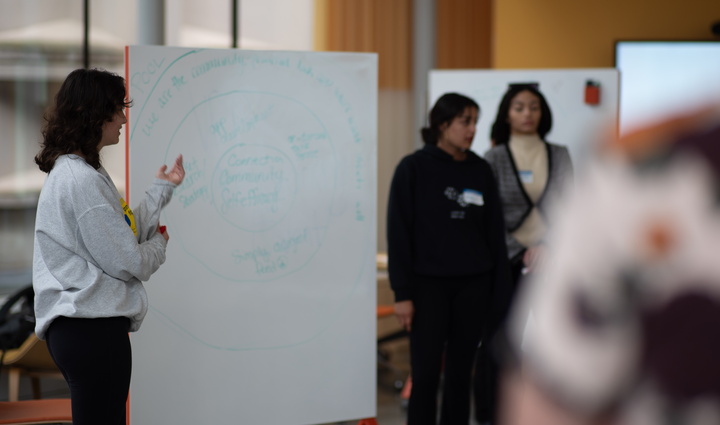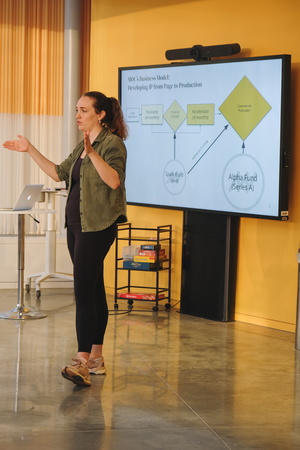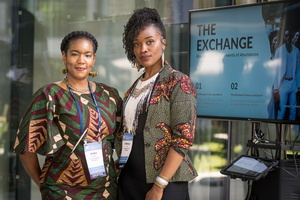How Women are Shaping an Inclusive Creator Economy

Today, more than 50 million people around the globe are monetizing their creativity online — and a recent Kit report found that nearly 65% of these creators identify as women. Women are not only leading, but also redefining the creator economy through a more inclusive and collaborative approach.
Challenging the Norms
Historically, business and entrepreneurship courses have skewed toward male-centric values. Teresa Chahine, Senior Lecturer in Social Entrepreneurship at the Yale School of Management, says, “When most people talk about entrepreneurship, they end up talking about men. Courses teaching entrepreneurship use cases that are 90% or more male protagonists.” In an effort to counteract this, Teresa is co-authoring a book about women entrepreneurs, showcasing how they navigate a system that wasn’t built for them. She says, “They always have to not just find a new way, but also, they have to make their own path.”
Creating Collaborative Communities

Frances Pollock (MUS ’25), a composer from rural North Carolina, saw her professional work opportunities dry up during the pandemic and asked herself, “How can I make sure my creative life is sustainable?” She connected with other innovators through the Tsai Center for Innovative Thinking at Yale (Tsai CITY), leading to the launch of the Midnight Oil Collective (MOC), which provides infrastructure to support creators in the arts. The collective empowers creators to scale their intellectual property while benefiting from the ownership of their work rather than selling it to intermediaries.
For example, MOC helped playwright Majkin Holmquist (DRA ’18) establish a holding company for her intellectual property, ensuring she could retain control of her work while building it out into multiple formats — from plays to books to TV shows.
Beyond empowering individual artists to act entrepreneurially, Midnight Oil Collective is taking larger steps to change how the creator economy functions. Frances says, “What we're trying to do right now is think very critically about the ways that the arts can play a productive role in the economy.” This includes collaborating with state agencies and educational institutions to explore how the creator economy could better support itself, such as by transforming nonprofits into for-profit entities that incubate creative work.
Redefining Success in Sustainability
Rakel Tanibajeva (YSE ’23), an environmental studies major with a concentration in business and supply chain management and optimization, has always been passionate about sustainability. She dreams of revolutionizing the supply chain and running a sustainable monopoly.
In 2020, Rakel founded Lots of Berries, a high-fashion clothing company that upcycles high-quality fabrics, contributing to a circular economy. She noticed that discussions about sustainability often turned people off as they associated it with a lack of profitability. She says, “I realized that money talks, and if I were to make a large-scale positive impact, it had to be in a way that was also inherently profitable.”
Inspired by fungi-based alternative leather, she started conducting her own research. Hoping to create a sustainable platform for platform shoes, she developed a thick, foam-like material. Recognizing its greater potential as a biodegradable packing material, she launched YouBio, a manufacturing company that produces protective packaging and other products made using fungi and waste.
During meetings with potential investors, Rakel noticed that their questions often revealed preconceived assumptions. Instead of asking, “What does your revenue stream look like?” or “What are your next steps?” they’d ask, “How do you know what you’re talking about?” They doubted her expertise — even though she had developed the material herself.
Although Rakel encountered gender-based skepticism from investors, she believes that innovation and intelligence have no gender. “Power, capability, and intelligence do not have an inherent gender to me,” she asserts.
When encountering gender bias or other obstacles, Rakel turns to a network of trusted peers, and she advises other women in the creator economy to do the same. At first, she was scared to be vulnerable with others, because she didn’t want to seem weak, but she says, “I found that with a strong network, I had that safe space to voice any concerns, pain points, challenges, and be able to get really fruitful advice, resources and support.”
Building Supportive Networks

For Hafeeza Turé, co-founder of The Elements of Abundance — a New Haven organization working to connect creative and innovative entrepreneurs across the globe — building community is crucial in a field where many creators work in isolation. “Community is so important, because we can, in real time, share what we're going through, share what changes have happened, some things that we've come up against, and how we've gotten through it.”
Hafeeza finds that many content creators face similar challenges, such as finding the time, energy, and money to produce consistent content and maintain visibility. She encourages women to seek coaching and mentorship, especially when entering unfamiliar spaces. “I believe in the proverb that we can go farther together, and when we tap into those who resonate with what it is that we're doing, it really does add so much value.”
The inclusive, collaborative environment these women describe is at the core of the creator economy, and it’s paying off in a big way. Goldman Sachs estimates that the creator economy could reach $480 billion in value by 2027. With creativity and community, female creators continue to pave the way for an equitable, innovative creator economy.